Tuesday, April 23, 2024. Annette’s News Roundup.
I think the Roundup makes people feel not so alone.
To read an article excerpted in this Roundup, click on its blue title. Each “blue” article is hyperlinked so you can read the whole article.
Please feel free to share.
Invite at least one other person to subscribe today! https://buttondown.email/AnnettesNewsRoundup
Remember: when you share the Roundup, you are fighting Fascism and helping to bring about a Democratic victory in 2024.
____________________________________________
Joe is always busy.
Young Americans know that the climate crisis is the existential threat of our time.
— President Biden (@POTUS) April 22, 2024
They deserve leaders who believe them.
We’re not going to let them down. pic.twitter.com/bBSUYgiuEC
Tonight, Jews around the world will celebrate Passover, a holiday that reminds us that even in the face of persecution, if we hold on to faith, we shall overcome.
— President Biden (@POTUS) April 22, 2024
Let us remember that even in the darkest times, the promise of God’s protection will give us strength to find hope. pic.twitter.com/h2akZ2ylJM
.@POTUS: “I’m proud to announce that Americans across the country can now apply to become the FIRST members of the American Climate Corps. We’re recruiting for over 2,000 positions in 36 states, Washington D.C. and Puerto Rico with more on the way.”
— Karine Jean-Pierre (@PressSec) April 22, 2024
Tap to watch the President speak on Earth Day.👇
Happy Earth Day, folks!
— President Biden (@POTUS) April 22, 2024
Today, I’m reminded of the work we must do to protect our planet for future generations.
I’m also reminded of the historic progress we’ve already made — building a cleaner, healthier planet for every American.
And we’re just getting started. pic.twitter.com/lQnsVUl98q
AOC provided a Biden testimony.
Rep. @AOC: President Biden has taken swift executive action to protect the planet. It is no accident that President Biden is overseeing the single biggest federal investment in tackling the climate crisis in U.S. history pic.twitter.com/LiZzfm13oH
— Biden-Harris HQ (@BidenHQ) April 22, 2024
____________________________________________
Kamala was always busy.
This Earth Day and every day, we’re working to protect our environment, not just for ourselves but for future generations. pic.twitter.com/LkHMJCnpLv
— Kamala Harris (@KamalaHarris) April 22, 2024
____________________________________________
Younger voters.
Where do they stand now.
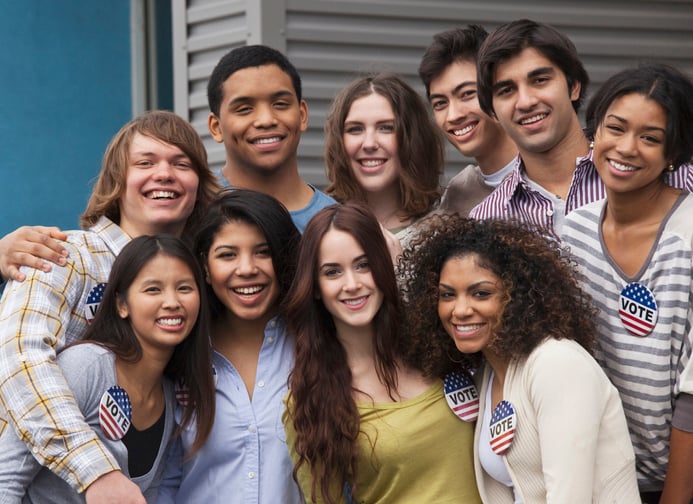
Younger votes still lean toward Biden — but it’s complicated.
Younger voters turned out in historic numbers to help lift Joe Biden past Donald Trump in the 2020 presidential election. This year, the match-up is the same, but the feelings are much more complicated.
Gen Z and late Millennial voters (ages 18-29) are more dissatisfied with their choices and worried over kitchen table issues such as inflation and housing. But most still support Biden over Trump, contrary to some earlier polls, and they do still intend to make their voices heard in November, according to a new Harvard Youth Poll released Thursday.
John Della Volpe, the IOP’s longtime polling director, said he sees “seismic mood swings” in the results as young people feel “angst” over a host of issues.
“They’re deeply concerned … about the direction of the country. They are deeply concerned about their own economic well-being, the cost of housing, inflation, [the] day-to-day cost of living. They’re concerned about conflicts around the world,” he said. “But at the same time, the choice between Donald Trump and Joe Biden isn’t necessarily close.”
The poll surveyed just over 2,000 Americans nationwide between the ages of 18 and 29 from March 14-21. The margin of error is plus or minus 3.02 points. Launched in 2000, the Harvard Youth Poll is the largest political survey of young Americans and is administered by the Harvard Public Opinion Project, an undergraduate-run organization.
In a head-to-head matchup, Biden leads Trump by eight points (45 percent-37 percent). Among those most likely to vote, his lead expands to 19 points (56 percent-37 percent). That’s considerably smaller than Biden’s advantage in spring 2020 when he was up by 23 points among all young voters and 30 points among likely voters.
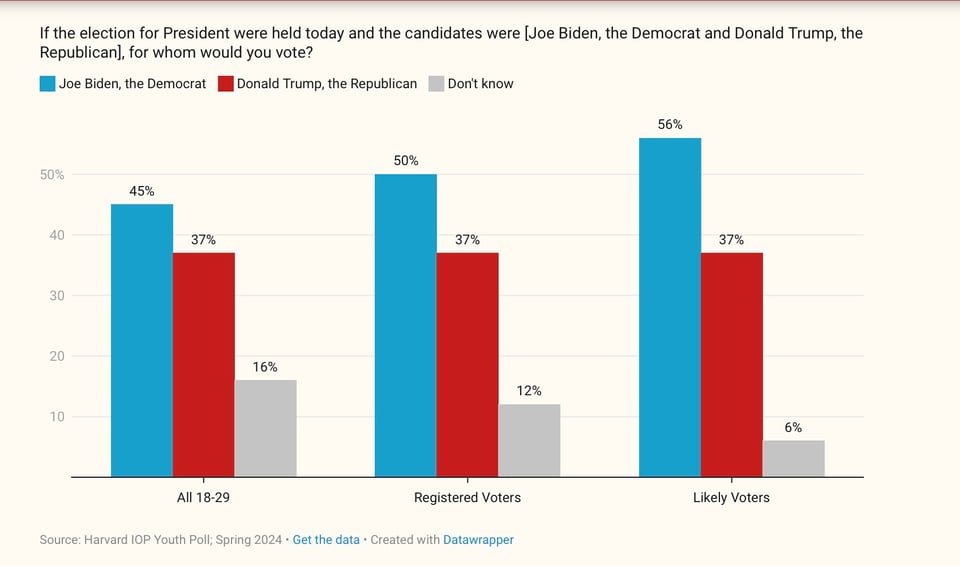
When third-party and independent candidates Robert F. Kennedy Jr., Jill Stein, and Cornel West are included, Biden’s lead over Trump shrinks from 19 to 13 points among likely voters.
Trump enjoys significant enthusiasm (76 percent) from those who already favor him but can’t seem to garner more than 37 percent of support from young voters.
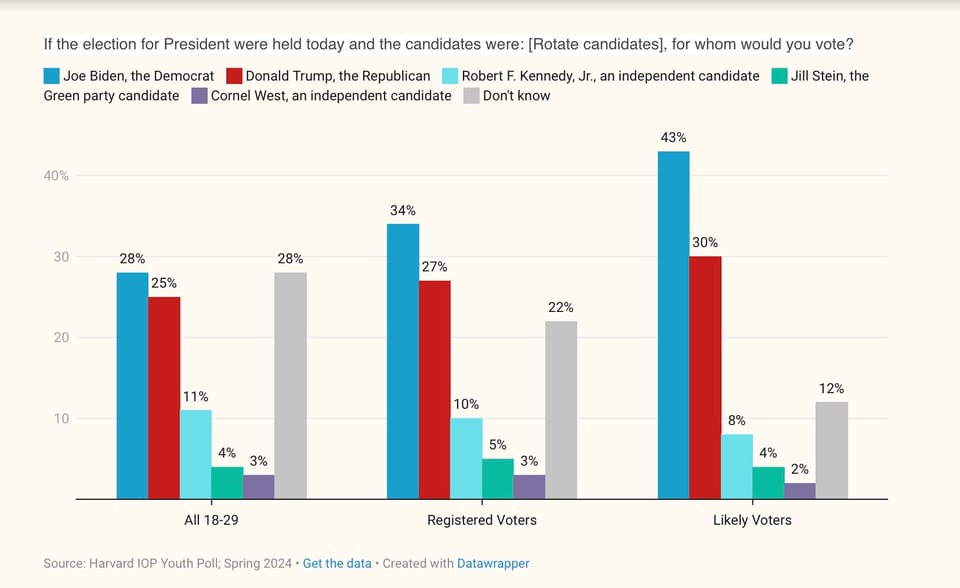
The outcome of his current criminal trial in New York City, however, could damage that support.
Trump has been charged with falsifying business records to conceal an extramarital affair in 2016 in a case prosecuted by Manhattan District Attorney Alvin Bragg ’95, J.D. ’99. The survey showed that if Trump is found guilty, Biden would get a nine-point bump among likely voters and a 10-point bump among all young people.
Asked whether the country is on the right or wrong track, more than half (58 percent) said the wrong track, and nearly one-third were unsure. Only 9 percent said the country is moving in the right direction, the first time this number was in the single digits in the poll’s 24-year history, organizers said. Four years ago, 21 percent said the nation was headed in the right direction.
Thinking about the major issues facing the United States today, please tell me which of the following two is more important to you:
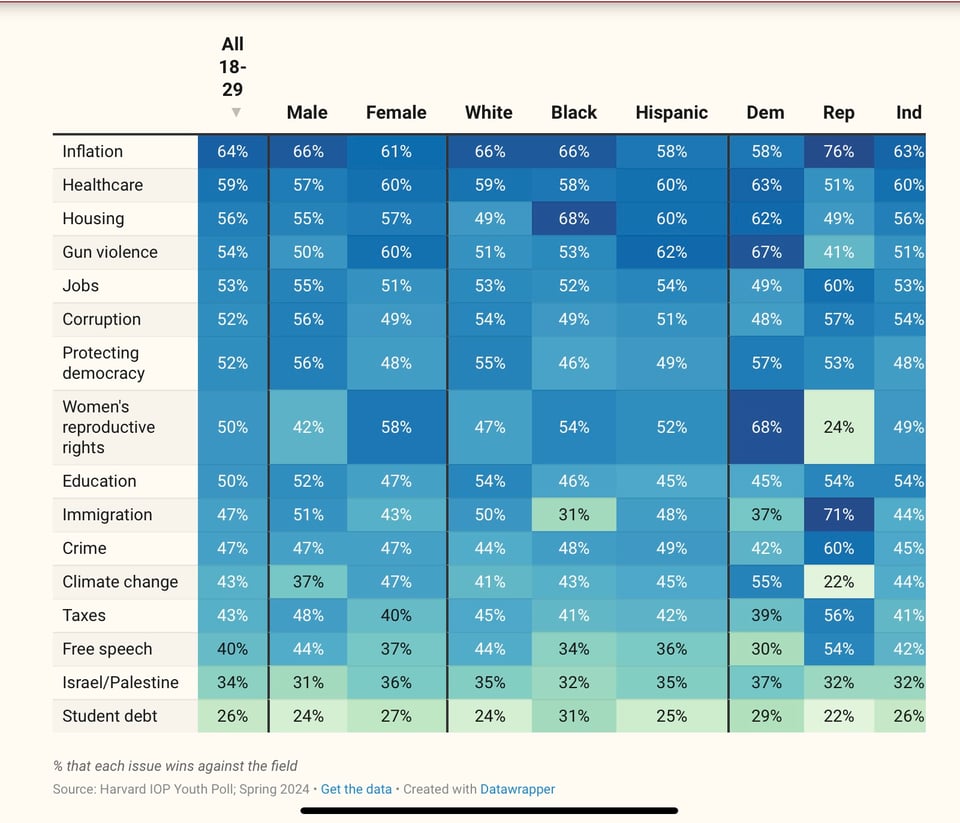
Some Democrats have voiced concerns that significant numbers of young voters, dissatisfied with their election choices, might sit out the 2024 election. According to the poll, 53 percent say they’ll “definitely” vote this fall, compared to 54 percent who said the same and did so in numbers that helped propel Biden to victory in 2020.
Poll results showed that two issues closely associated with under-30 voters — the Israel-Hamas war and student debt relief — may not be especially consequential ones when it comes to casting votes.
Biden gets good marks (39 percent) for his efforts to reduce student debt, and poor marks for his handling of the war in Gaza (18 percent). But young people ranked these as least important among the issues facing the country. The majority said inflation, healthcare, and housing were the top three matters, followed by gun violence, according to the poll.
Confidence in the nation’s institutions has plummeted among younger Americans over the last two election cycles. Since 2015, trust in the presidency has dropped 60 points and in the Supreme Court by 55. Wall Street (9 percent) and the media (10 percent) are trusted least, but even the U.S. military, once considered largely above doubt, is now trusted by only 36 percent surveyed. (Harvard Gazette).
Share this article
NPR.
About 27% of voters between the ages of 18-29 cast a ballot in the midterm election this year, according to an early estimate from the Center for Information and Research on Civic Learning and Engagement at Tufts University, also known as CIRCLE.
Researchers say the 2022 election had the second highest voter turnout among voters under 30 in at least the past three decades. So far, the highest turnout during a midterm for this voting bloc is 2018 when about 31% of young people who are eligible to vote cast a ballot.
___
The Free Palestine Movement is spreading and shutting down our campuses.

____________________________________________
Liz Cheney fights to stop Trump.
We all know what is at stake on November 5, 2024. Democracy. Isn’t it time for Liz Cheney to grab other like-minded Republicans shocked by Trump (sample, Mitt Romney) to campaign for Biden?
Liz Cheney: The Supreme Court Should Rule Swiftly on Trump’s Immunity Claim.
On Thursday, the U.S. Supreme Court will hear Donald Trump’s arguments that he is immune from prosecution for his efforts to steal the 2020 presidential election. It is likely that all — or nearly all — of the justices will agree that a former president who attempted to seize power and remain in office illegally can be prosecuted. I suspect that some justices may also wish to clarify whether doctrines of presidential immunity might apply in other contexts — for example, to a president’s actions as commander in chief during a time of war. But the justices should also recognize the profoundly negative impact they may have if the court does not resolve these issues quickly and decisively.
If delay prevents this Trump case from being tried this year, the public may never hear critical and historic evidence developed before the grand jury, and our system may never hold the man most responsible for Jan. 6 to account.
The Jan. 6 House select committee’s hearings and final report in 2022 relied on testimony given by dozens of Republicans — including many who worked closely with Mr. Trump in the White House, in his Justice Department and on his 2020 presidential campaign. The special counsel Jack Smith’s election-related indictment of Mr. Trump relies on many of the same firsthand witnesses. Although the special counsel reached a number of the same conclusions as the select committee, the indictment is predicated on a separate and independent investigation. Evidence was developed and presented to a grand jury sitting in Washington, D.C.
The indictment and public reporting suggest that the special counsel was able to obtain key evidence our committee did not have. For example, it appears that the grand jury received evidence from witnesses such as Mark Meadows, a former Trump chief of staff, and Dan Scavino, a former Trump aide, both of whom refused to testify in our investigation. Public reporting also suggests that members of Mr. Trump’s Office of White House Counsel and other White House aides testified in full, without any limitations based on executive privilege, as did Vice President Mike Pence and his counsel.
The special counsel’s indictment lays out Mr. Trump’s detailed plan to overturn the 2020 election, including the corrupt use of fraudulent slates of electors in several states. According to the indictment, senior advisers in the White House, Justice Department and elsewhere repeatedly warned that Mr. Trump’s claims of election fraud were false and that his plans for Jan. 6 were illegal. Mr. Trump chose to ignore those warnings. (Remember what the White House lawyer Eric Herschmann told Mr. Trump’s alleged co-conspirator John Eastman on Jan. 7, 2021: “Get a great f’ing criminal defense lawyer. You’re gonna need it.”) There is little doubt that Mr. Trump’s closest advisers also gave the federal grand jury minute-to-minute accounts of his malicious conduct on Jan. 6, describing how they repeatedly begged the president to instruct the violent rioters to leave our Capitol and how Mr. Trump refused for several hours to do so as he watched the attack on television. This historic testimony about a former president’s conduct is likely to remain secret until the special counsel presents his case at trial.
As a criminal defendant, Mr. Trump has long had access to federal grand jury material relating to his Jan. 6 indictment and to all the testimony obtained by our select committee. He knows what all these witnesses have said under oath and understands the risks he faces at trial. That’s why he is doing everything possible to try to delay his Jan. 6 federal criminal trial until after the November election. If the trial is delayed past this fall and Mr. Trump wins re-election, he will surely fire the special counsel, order his Justice Department to drop all Jan. 6 cases and try to prevent key grand jury testimony from ever seeing the light of day.
I know how Mr. Trump’s delay tactics work. Our committee had to spend months litigating his privilege claims (in Trump v. Thompson) before we could gain access to White House records. Court records and public reporting suggest that the special counsel also invested considerable time defeating Mr. Trump’s claims of executive privilege, which were aimed at preventing key evidence from reaching the grand jury. All of this evidence should be presented in open court, so that the public can fully assess what Mr. Trump did on Jan. 6 and what a man capable of that type of depravity could do if again handed the awesome power of the presidency.
Early this year, a federal appeals court took less than a month after oral argument to issue its lengthy opinion on immunity. History shows that the Supreme Court can act just as quickly, when necessary. And the court should fashion its decision in a way that does not lead to further time-consuming appeals on presidential immunity. It cannot be that a president of the United States can attempt to steal an election and seize power but our justice system is incapable of bringing him to trial before the next election four years later.
Mr. Trump believes he can threaten and intimidate judges and their families, assert baseless legal defenses and thereby avoid accountability altogether. Through this conduct, he seeks to break our institutions. If Mr. Trump’s tactics prevent his Jan. 6 trial from proceeding in the ordinary course, he will also have succeeded in concealing critical evidence from the American people — evidence demonstrating his disregard for the rule of law, his cruelty on Jan. 6 and the deep flaws in character that make him unfit to serve as president. The Supreme Court should understand this reality and conclude without delay that no immunity applies here.(Op-ed, the New York Times).
No President who tries to steal an election and seize power is entitled to immunity for those acts. The American people deserve to hear all of the J6 evidence presented in open court. SCOTUS should conclude without delay that no immunity applies here. https://t.co/GUH9SxLDLJ
— Liz Cheney (@Liz_Cheney) April 22, 2024
____________________________________________
The first Trump criminal trial.
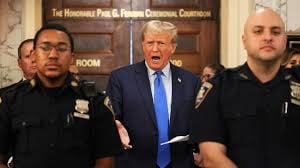
Prosecutors say Trump violated his gag order 10 times. The judge is finally set to weigh in.
— Blue Limousine ¯\_(ツ)_/¯ (@BleuLimousine) April 22, 2024
Justice Juan Merchan has scheduled a Tuesday hearing on prosecutors' request to hold Trump in contempt.https://t.co/g4mdXwwZlz
This trial is not about hush money. It is about election interference.
Trump trial in "hush money" case gets underway with opening statements and first witness - CBS News.
Jurors in former President Donald Trump's criminal trialin New York got their first glimpse Monday of the arguments both sides plan to make over the course of the historic proceedings, with the prosecution and defense teams presenting their opening statements as Trump looked on.
Prosecutors also called their first witness to the stand: David Pecker, the former CEO of American Media Inc., or AMI, the parent company of the National Enquirer. The state alleges Pecker helped Trump during the 2016 campaign by burying negative stories about him and attacking his rivals.
Pecker testified for less than a half hour before the court adjourned for the day. He will resume testimony on Tuesday, after a hearing over whether Trump should be held in contempt of court for defying a gag order imposed by the judge in the case.
Trump is charged with 34 felony counts of falsifying business records, allegedly to cover up a "hush money" payment before the 2016 election. He has pleaded not guilty. An attorney from Manhattan District Attorney Alvin Bragg's office said the reimbursements were part of a scheme that amounted to "election fraud, pure and simple." Trump's lawyer argued that his client did not commit a crime, and said he has been charged on flimsy evidence from an untrustworthy key witness.
Arriving at the courthouse, Trump claimed the trial was "election interference" and part of an effort to keep him off the campaign trail. He called the case a "witch hunt" and "a shame."
Prosecutors' opening statement
Lawyers from Bragg's office had 40 minutes to present their opening statements, and Trump's attorneys had 25 minutes. Matthew Colangelo, a member of Bragg's team, kicked things off for the prosecution, laying out the central allegations in the case.
Just days before the 2016 election, Trump's attorney at the time, Michael Cohen, paid $130,000 to adult film star Stormy Daniels to buy her silence about an alleged sexual encounter she said she had with Trump years earlier. Trump denies the encounter.
Colangelo said Cohen made the payment "at the defendant's direction, and did it to influence the election." He portrayed the payment as part of a scheme concocted by Trump, Cohen and Pecker to bury negative stories about Trump and attack his rivals. The plan was hatched at a meeting at Trump Tower in 2015, Colangelo said.
Together they conspired to influence the 2016 presidential election," Colangelo told the jury, saying Pecker agreed to act as Trump's "eyes and ears" during the 2016 campaign. Pecker is expected to be the first witness called by the prosecution after opening statements.
Colangelo laid out the "catch and kill" tactic allegedly used by Pecker and Dylan Howard, the Enquirer's editor, to shield Trump from negative stories. The practice involved buying the rights to someone's story and then declining to publish the account, effectively keeping it hidden. They also used the Enquirer to publish unflattering stories about Trump's rivals.
Prosecutors allege AMI, the Enquirer's parent company, employed the "catch and kill" tactic twice before the payment to Daniels. One instance involved a $150,000 payment to a former Playboy model to secure the rights to her story. The model, Karen McDougal, also alleged an affair with Trump, which he denies. Colangelo told jurors they would hear a recording of Cohen promising to set up a shell company to buy the rights to McDougal's story from the Enquirer to reimburse Pecker for the purchase.
In the weeks leading up to the 2016 election, Daniels' lawyer approached the Enquirer about selling the rights to her story as well, Colangelo said. Howard put the lawyer in touch with Cohen, who negotiated the $130,000 payment, according to prosecutors. Colangelo said Trump hoped to delay the deal until after the election, and then not pay at all. Cohen ultimately transferred the money to Daniels' attorney just days before Election Day.
"This was a planned, coordinated, long-running conspiracy to influence the 2016 election to help Donald Trump get elected," Colangelo told the jury. "It was election fraud, pure and simple."
Trump reimbursed Cohen for the payment in 12 monthly installments during the first year of his presidency, portraying them as checks for ongoing legal services in an illegal scheme to conceal their true purpose, according to prosecutors. Cohen ultimately received $420,000 — more than double the $130,000 payment to Daniels.
"Donald Trump was a very frugal businessman. He believed in pinching pennies. He believed in watching every dollar. He believed in negotiating every bill. He ran the Trump Organization with total control. You'll hear testimony about his relentless focus on the bottom line. With Cohen and the 'catch and kill' deal, he didn't negotiate the price down, he doubled it," Colangelo said. "And you'll hear evidence that the Trump Organization was not in the practice of paying twice what they owed for anything."
The defense's statement
Todd Blanche, an attorney for Trump, delivered the defense's opening statement after Colangelo. He said the jury is "going to learn that this was not a payback."
"Think for a moment of what the People just told you. President Trump did not pay Mr. Cohen back $130,000. President Trump paid Michael Cohen $420,000," Blanche said, as Trump watched him. "Would a frugal businessman, would a man who 'pinches pennies,' repay a $130,000 debt to the tune of $420,000?"
He said the $35,000 that Cohen received each month was for his services as Trump's personal attorney, not as reimbursement for the Daniels payment. He argued that Trump "had nothing to do with the 34 pieces of paper….except that he signed them in the White House, while he was running the country." Each charge in the indictment refers to a record created to document a payment to Cohen.
"There's nothing wrong with trying to influence an election. It's called democracy. They've put something sinister on this idea, as if it was a crime," Blanche continued. "President Trump fought back like he always does, and like he's entitled to do. To protect his family, his reputation and his brand. And that is not a crime."
Blanche said Cohen is "obsessed" with Trump and has been for "many, many years." He argued that Cohen decided "to blame President Trump for all of his problems" when he was arrested on federal charges in 2018.
"He has talked extensively about his desire to see President Trump go to prison. He has talked extensively about his desire to see President Trump's family go to prison," Blanche said.
"He has a goal, and obsession, with getting Trump," he continued, adding later, "I submit to you that he cannot be trusted."
Blanche later noted that Cohen has lied under oath, and said Daniels had a grudge against Trump after not being cast on "The Apprentice" in 2007. Blanche claimed Daniels has profited from her allegations.
"I'll also say something else about her testimony: it doesn't matter," Blanche said, telling jurors she has "no idea" about the alleged crimes at the center of the case. "Her testimony, while salacious, does not matter."
Finally, he turned to the "catch and kill" tactic, saying it's not illegal and not a conspiracy.
"It's not a scheme, unless a scheme means something that doesn't matter, that's not illegal, that's not against the law," Blanche said.
David Pecker's testimony
On the stand, Pecker testified broadly about AMI's operations and Howard's role as editor in chief of the National Enquirer. Pecker left the company in 2020.
Under questioning by prosecutor Joshua Steinglass, Pecker said he had final say over what Steinglass described as particularly "juicy" stories.
"We used checkbook journalism," Pecker said, describing how editors were empowered to spend up to $10,000 on sourcing for stories, but that larger expenses "would have to be vetted and brought up to me for approval."
Pecker confirmed that Howard "kind of ran the network of sources for all of AMI's publications."
"As an editor of a tabloid magazine, you develop over the years a group of sources, and the sources might be the people who work in hotels, the people who work for lawyers, people who work for various different aspects a celebrity might be using — for example, like a limousine service."
Pecker said he had heard that Howard is now living in his native Australia, with a spinal condition that makes international travel impossible.
After less than 30 minutes, Merchan adjourned the court for the day, and implored jurors not to discuss the case outside the courthouse.
"Please put the case out of your mind," he said. "Don't think about it. Don't talk about it. And don't read anything about it." (CBS News).
__
@AdamKlasfeld -
According to the prosecution's opening statement:
On election night 2016, as Trump edged closer to being declared the victor, Stormy Daniels' then-attorney Keith Davidson sent this text message to National Enquirer editor in chief Dylan Howard:
"What have we done?"
What did they do, indeed.
___
Jimmy Carter felt he knew why Trump “won” in 2016.
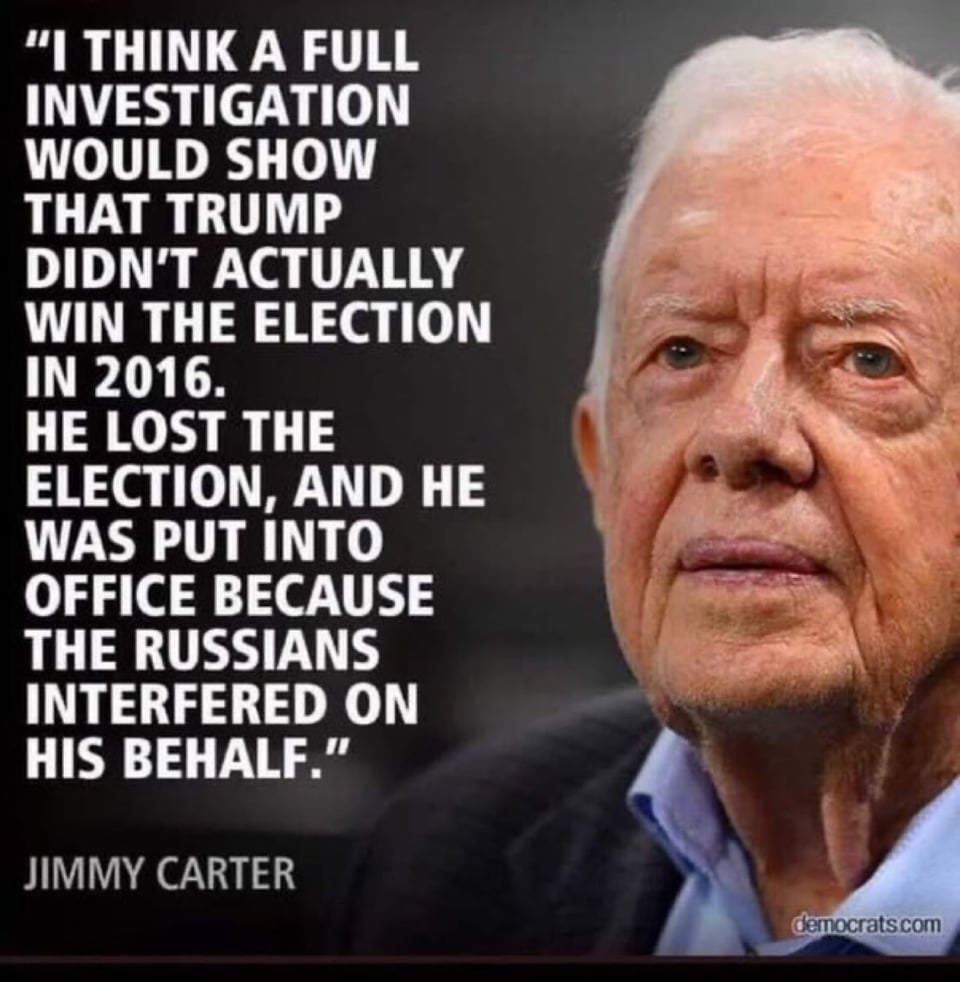
Today, more from David Pecker.
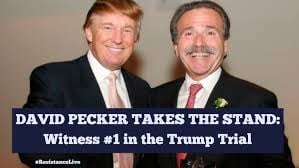
____________________________________________
Last night was the first night of Chanukah, the Jewish festival of freedom.
Here is some history of the American celebration of the holiday.
The Taylor Swift Haggadah? The Harry Potter version? Maxwell House is the Passover prayer book of presidents.
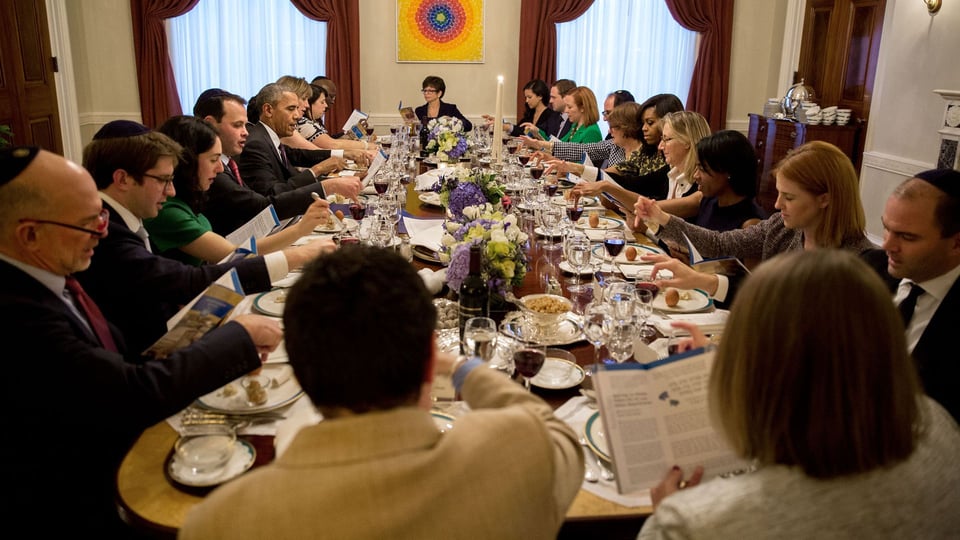
The Obamas host a Passover Seder dinner with friends and staff at the White House in 2016, with guests reading from the Maxwell House Haggadah.
President Obama used it for his groundbreaking White House Passover Seders. Kamala Harris used it for the first Passover in the Naval Observatory vice presidential residence.
And tonight, the Maxwell House Haggadah will likely be used at the Passover table by Jews around the world more than any other single text.
Why it matters: Amid a spate of newfangled prayer books for Passover — like a Taylor Swift Haggadah, various e-Haggadahs (which aren't strictly kosher), and a Hogwarts one — the traditional and historic Maxwell House version is an enduring favorite.
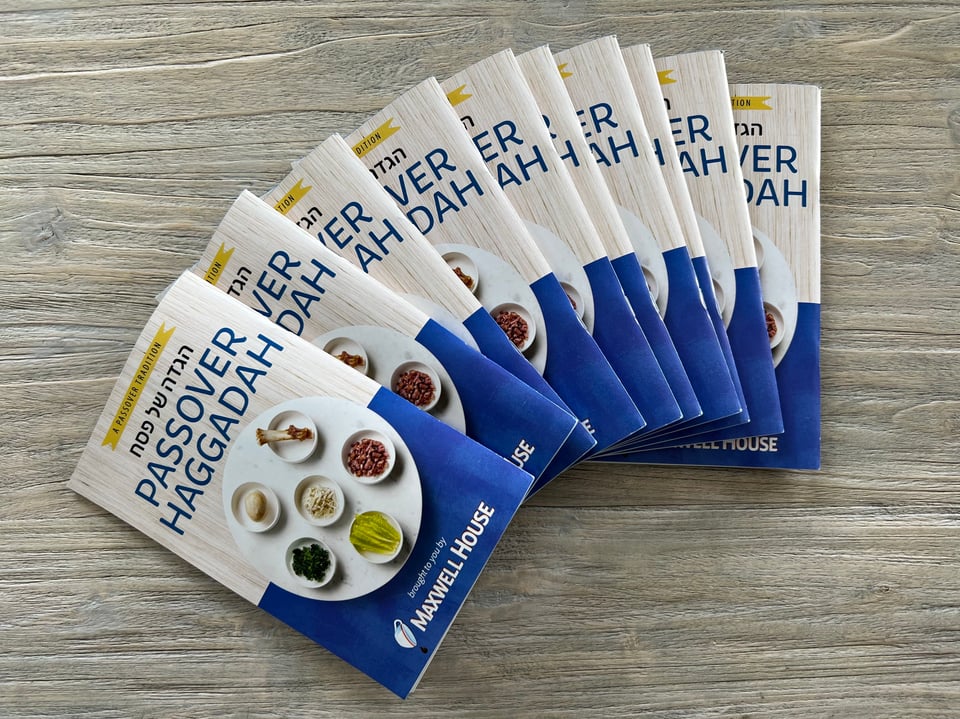
The a 92-year-old prayer booklet (and branding opportunity) tells the story of Passover in 57 pages, in Hebrew and English. (The word "Haggadah" means "telling.")
"It's a physical token of Jewish-American history, tradition and culture," said Elie Rosenfeld, CEO of the Joseph Jacobs Advertising agency of Teaneck, New Jersey, which distributes the free books.
The Maxwell House Haggadah is available free at supermarkets or through online orders. Photo: Clifford A. Sobel for Axios.
Driving the news: This year, 400,000 copies of the Maxwell House Haggadah were printed, adding to 60 million total that have been printed over the years.
The book holds "significant cultural importance," says Rosenfeld, whose company first advertised it in 1932 in the Forward, a Jewish newspaper.
It's distributed free in supermarkets across the United States — such as ShopRite, Kroger, Stop & Shop and Publix — and also available online for the price of postage alone.
"It's the longest running promotion of any major brand in the U.S.," Kelly Webb, senior brand manager at Kraft Heinz, the maker of Maxwell House coffee, tells Axios.
Presidential connection: The Obamas were the first sitting presidential family to host a White House Passover White House Passover Seder, every year from 2009-2016 — relying on the text from Maxwell House.
The private dinner featured traditional foods like charoset, gefilte fish, brisket and matzah ball soup.
They used silverware from the Truman administration — the first to recognize the nation of Israel — and a Seder plate gifted in 2013 by Israeli first lady Sara Netanyahu.
What they're saying: "They made the whole kitchen kosher," recalled Rosenfeld, whose agency specializes in marketing to Jewish consumers.
One year, "I actually pitched the White House, and we had a display of all of the Maxwell House Haggadahs going back from 1932 to present," he told Axios.
"Right next to us was the letter to the Jews by Washington that they brought in as a display from the Library of Congress," he said, referring to George Washington's 1790 letter to the congregation of Touro Synagogue in Newport, Rhode Island.
The letter, an eloquent expression of the value of religious liberty, promises that the U.S. government "gives to bigotry no sanction, to persecution no assistance."
Fun fact: Jeffrey Goldberg, editor-in-chief of the Atlantic, interviewed Obama in 2011 and showed him a copy of "The New American Haggadah" that writer Jonathan Safran Foer had just published.
"After thumbing through the sleek hardcover book, Mr. Obama looked up and asked wryly, 'Does this mean that we can't use the Maxwell House Haggadah anymore?'" as the New York Times described it.
Catch up quick: President Trump skipped the Seder that some of his aides held in the Eisenhower Executive Office Building in 2017, as did his daughter and son-in-law, who are Jewish.
President Biden's White House has held a virtual "People's Seder," but he, too, has skipped the event.
But Harris and her husband, Doug Emhoff, who is Jewish, hosted a Seder in 2022 at which the Maxwell House book was used.
Here's a video about the history of Passover at the White House.
Back story: The Maxwell House Haggadah was introduced as a way to persuade Jews that coffee was acceptable to drink during the 8-day holiday.
"Coffee beans were thought to be legumes, and therefore prohibited according to Ashkenazic tradition," as The Nosher explains.
Joseph Jacobs, the advertising manager for the Forward in the 1920s, "consulted with several rabbis who understood that coffee beans were not beans at all" but rather "the seeds of the coffee cherry."
Maxwell House received the first kosher Passover certification for its coffee in 1923 and became the favored brand among American Jews.
Between the lines: "The Maxwell House Hagaddah has been in the hands of U.S. servicemen and women on every battlefield since World War II," Rosenfeld said.
"When the serviceman in the field gets that one box of matzah and a Maxwell House Haggaddah is included, it brings them back to their parents' Passover table."
Zoom in: The Passover Seder tends to be a long dinner at which children get antsy and hungry — you have to wait for most of the service to be over before you can eat.
Of the many new Haggadahs published each year, some are modern and emphasize social justice, while others are geared toward entertaining kids.
A "Star Wars" parody Haggadah guides readers through a "Darth Seder," refers to matzah as "polystarch puffbread" and asks, "Why is this galaxy different from other galaxies?"
Maxwell House is one of the more traditional versions. "I do know that it is used across the spectrum of Jews," says Rosenfeld.
This Passover is a particularly emotional one for many Jews, because of the war in Gaza, record antisemitism, and an FBI alert about Passover threats to Jews.
What's next: May is Jewish American Heritage Month, as proclaimed by President George W. Bush in 2006. (Axios)
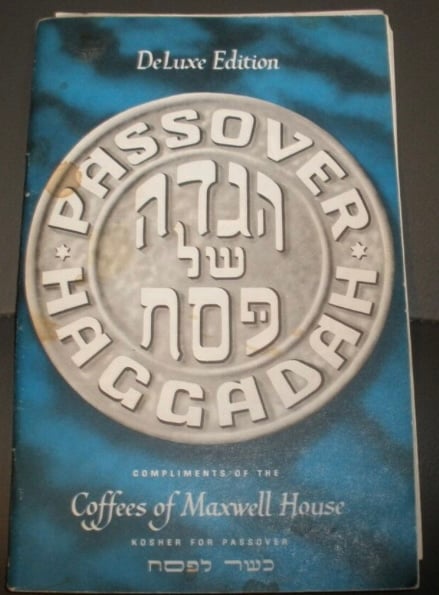
The 1965 Maxwell House Haggadah was the story of Passover that I grew up with. You?
____________________________________________